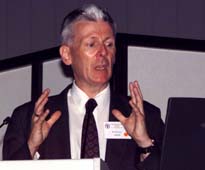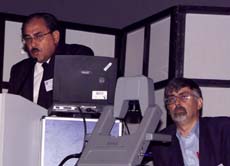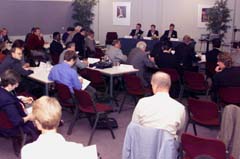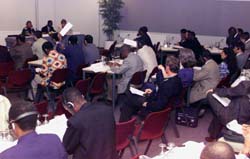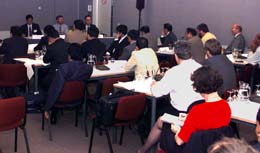|
Cultivating
our Futures: FAO/Netherlands Conference on the Multifunctional
Character of Agriculture and Land |
|
|
|
|
|
|
should be rewarded for whatever contribution is asked of them, including the provision of public goods, and urged targeted payments that do not result in market distortions |
|
|
Des McGarry presented a case study on land management for Australian cotton. The "multiple output system" was farmer-driven and assisted by scientifically-based research and training. It demonstrated that mechanization is not a panacea and that an understanding of soils and other physical factors is essential. |
|
|
Tan Gherrat and Luis Alvarez Welchez presented a case study from Lempira Sur, Honduras. A system based on natural regeneration of trees was implemented. As a result of these activities, profits, wages and productivity have increased; the area now has a food supply surplus; forest burning has been brought under control; erosion has decreased; and the local population is less dependent on outside factors and thus more confident in its development prospects. |
|
|
Participants met in five regional groups in morning and afternoon sessions to continue discussion of the MFCAL approach and hear presentations of additional case studies. The discussion of the EUROPE AND NORTH AMERICA group, co-chaired by Eli Reistad (Norway) and Raphael Briedenbach (Germany) centered on a few key issues, including: the need to consider off-farm activity in the contemporary rural economy; the implications of global trade and markets for small farmers; and valuation of non-production aspects of agriculture. |
|
|
The
AFRICA regional group was chaired by J.H. Owusu- Acheampong (Ghana)
and Timothy Kirway (Tanzania). The group agreed that MFCAL is
only useful if it can contribute to achieving food security. Many
participants said the multifunctional nature of agriculture in
Africa is not a new concept, but it can help to identify practical
actions to implement SARD. Other important issues identified by
the group included:the need for stakeholder involvement in planning
and development; better information exchange; free trade; enabling
policies; and more investment.
|
|
|
The
ASIA-PACIFIC group, co-chaired by Vince McBride (New Zealand)
and Nelson P. Hutabarat (Indonesia), explored the question of
whether the concept of multifunctionality represents progress
beyond the SARD approach. It was observed that the concept is
not new, but the policy context, now characterized by globalization,
trade liberalization and national policy reform, has changed.
The MFCAL concept can thus be useful in generating awareness and
catalyzing governmental action and donor interest.
|
|
|
|
|
|
|
|

